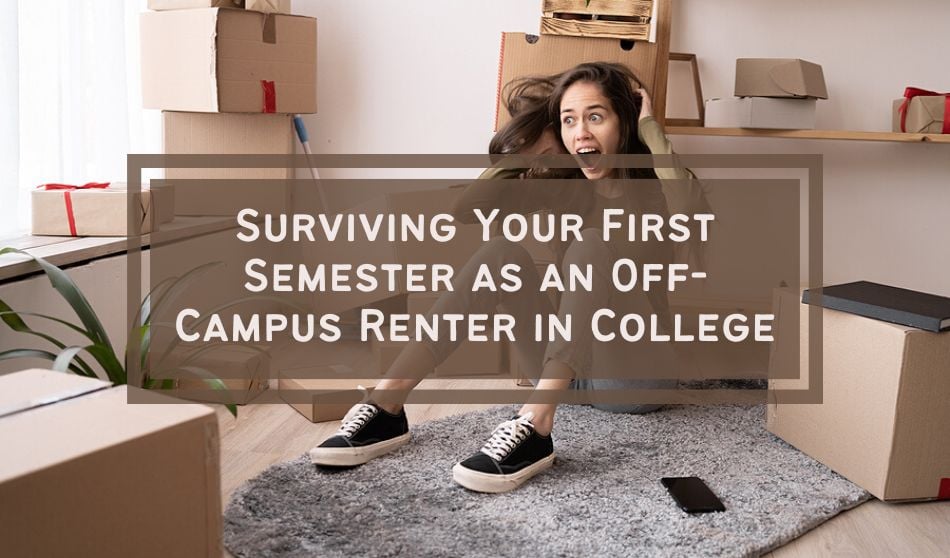
The fall semester is in full swing, and you’ve found yourself living off-campus with good friends, lower costs, and more freedom. Now’s a great time to embrace the responsibility of living independently and learn the big things as well as the minute details that go into renting, adulting, and keeping your landlord from making house calls. Whether you’re in a complex, a duplex, or a house, there are many ways to break in the space and make the most of your semester while learning as you go.
Have a Communication Plan
One of the most important things you can do as a renting student is to ensure ongoing transparency with your housemates, your landlord, and/or your property manager. For roommates, this often looks like discussing routines, responsibilities, and boundaries in the house.
- Who takes out the trash?
- How long can dishes be in the sink?
- Who can have access to each others’ rooms?
These and many other factors set healthy courtesy boundaries. Written or not, this conversation will establish the entire foundation of how you and your housemates co-exist. Whether they’re your best friends or a random selection, moving in together is really when personal routines come out into the open.
These discussions are also important for organizing bill payments. While rent can be handed-in individually, separate Wi-Fi and utilities usually require one designated person to have their name on an account and be the money collector. Splitting costs with housemates doesn’t have to be a chore, though. Most accounts will give you an option to pay automatically each month. Consider setting up a hard copy or virtual calendar that everyone in the house has access to, and set a reminder for money collection once the bills are available.
When ensuring communication with landlords or property managers, you’ll want to make sure that you know the best way to reach them (office phone, cell, email) and how to contact them during emergency hours. Being in college, your lease will likely detail the condition that your apartment should remain in, restrictions on parties, and a clause on items or fixtures that are broken recklessly. That being said, it’s still important to update your landlord if something needs fixing or replacement.
Moreover, you must be the one communicating with them. Parent involvement isn’t uncommon when it comes to back-to-school moves, but college is an important time to build a positive rapport with your landlord as a tenant. This will be especially important if you decide to rent elsewhere after graduation as a lot of places require you to provide old property managers’ information as references that you’ll fulfill the terms of your new lease.
Stay Proactive
Whether it’s your weekly groceries, monthly utilities, or long-term housing goals, staying proactive as a tenant will help to iron out a lot of details that come naturally with living away at school. Here are some things to consider budgeting for as a multi-tiered approach to successful proactivity:
- General Needs – Food, laundry, hygiene products, and nights out
- Monthly Bills – Rent, utilities, Wi-Fi, phone, insurance (renter’s, car)
- Long-Term Goals – Next year’s lease, buying a home after graduation, or starting your emergency fund buildup
Your parents might still be helping with a portion of your expenses either directly or as an allowance, and that’s okay. Regardless of your status as a financial dependent, now is a good time to balance frugality with future planning. This is also a great time to get a credit card if you haven’t to help build a strong foundation for your credit score.
College moves fast, as do the semesters. If you’ll be resigning a lease or moving into a different rental, you’ll want to do so in early spring for the following fall. Rentals fill quickly and homes are often taken in order of quality. A lack of proactivity could lead to no vacancies, random roommates, or a more run-down apartment that has seen quick turnover.
What’s more, if you’re interested in buying a home fresh off of graduation – whether you’re settling into a career or hoping to avoid the money pit that renting can occasionally be – you’re going to need to understand the market and your options. Coming directly from university into the home buying process can bring higher debt and lower credit scores, potential qualifiers for FHA loan assistance to ease your mortgage process. But before you can delve deeper into financing options, you’ll need to know how long it takes to get preapproved for a mortgage. This will be the foundation of both your timeline and your budget when investing in something as big as a house. Proactivity is key with each of these processes to ensure that you’re taken care of at every tier, even when the semester gets busy.
Establish A Routine
While dorm life came with certain conveniences, your first semester off campus will give you the opportunity to juggle responsibilities more reflective of the real world. In a college bubble where academics come first, but social and extracurricular activities are just as important, you’ll need to establish a routine of school, work, social, home, and self. Bigger tasks like laundry might need their own day of the week, especially if you’re sharing an in-unit system or have to lug your items to a laundromat. Additionally, you’ll want to find a one-time slot to plan and buy groceries and another to prep them for the week. Common areas like the kitchen and living room should be checked regularly to avoid piling your belongings where they would be uncourteous to others. And having a general understanding of your housemates’ routines can help you set boundaries with things like noise, guests, and bathroom time. If you’re in hybrid or remote classes, you’ll want to sanction off a workspace as best as you can to create a physical and mental divide between school and home, even if they’re in the same building or room.
There can be a lot of moving parts to living independently in college. You’ll learn a lot of book skills and life skills simultaneously. Don’t be afraid to mess up, ask questions, and get the feel for post-university living





